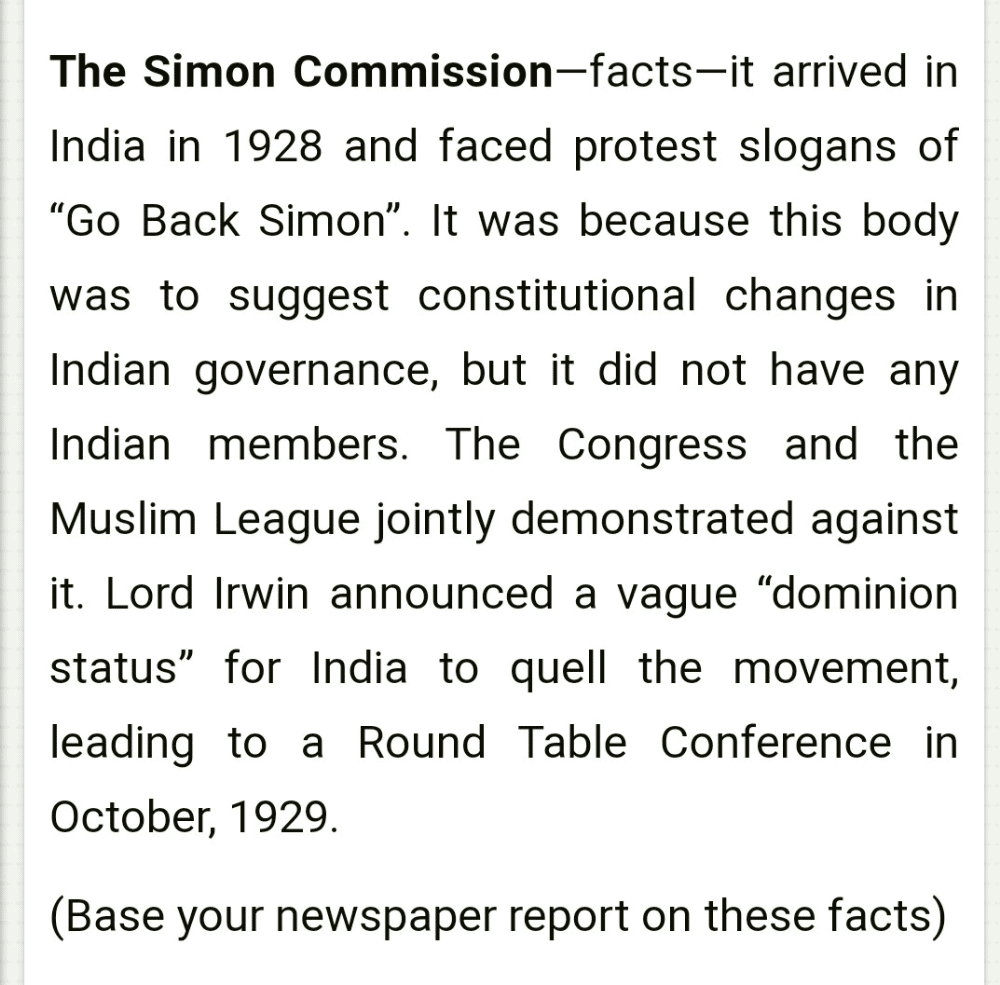Class 10 Exam > Class 10 Questions > Write a newspaper reports on the Simon commis...
Start Learning for Free
Write a newspaper reports on the Simon commission?
Most Upvoted Answer
Write a newspaper reports on the Simon commission?
Simon Commission Report
The Simon Commission was a group of seven British parliamentarians who were appointed by the British government to investigate and make recommendations for constitutional reforms in India. It was named after its chairman, Sir John Simon.
Background
The Indian National Congress had been demanding greater self-government and had called for a boycott of the British government's attempts to reform the Indian constitution. In response, the British government established the Simon Commission to investigate and make recommendations for constitutional reforms in India.
Composition of the Commission
The Simon Commission was composed of seven British parliamentarians, all of whom were white men. There were no Indian members of the commission, which was seen as a major flaw by many Indians.
Recommendations of the Commission
In 1930, the Simon Commission submitted its report which recommended several changes to the Indian constitution. These included:
- Separating Burma from India and granting it separate status
- Creating separate electorates for Muslims
- Expanding provincial autonomy
- Creating a federal structure for India
Reaction to the Commission's Report
The Simon Commission's report was met with widespread criticism and opposition in India. Many Indians were angry that there were no Indian members of the commission and felt that the recommendations did not go far enough in granting self-government to India.
Conclusion
The Simon Commission's report played a significant role in the Indian independence movement and helped to galvanize support for the Indian National Congress and other nationalist groups. It also highlighted the need for greater Indian representation in the British government's decision-making processes.
Community Answer
Write a newspaper reports on the Simon commission?


|
Explore Courses for Class 10 exam
|

|
Similar Class 10 Doubts
Write a newspaper reports on the Simon commission?
Question Description
Write a newspaper reports on the Simon commission? for Class 10 2025 is part of Class 10 preparation. The Question and answers have been prepared according to the Class 10 exam syllabus. Information about Write a newspaper reports on the Simon commission? covers all topics & solutions for Class 10 2025 Exam. Find important definitions, questions, meanings, examples, exercises and tests below for Write a newspaper reports on the Simon commission?.
Write a newspaper reports on the Simon commission? for Class 10 2025 is part of Class 10 preparation. The Question and answers have been prepared according to the Class 10 exam syllabus. Information about Write a newspaper reports on the Simon commission? covers all topics & solutions for Class 10 2025 Exam. Find important definitions, questions, meanings, examples, exercises and tests below for Write a newspaper reports on the Simon commission?.
Solutions for Write a newspaper reports on the Simon commission? in English & in Hindi are available as part of our courses for Class 10.
Download more important topics, notes, lectures and mock test series for Class 10 Exam by signing up for free.
Here you can find the meaning of Write a newspaper reports on the Simon commission? defined & explained in the simplest way possible. Besides giving the explanation of
Write a newspaper reports on the Simon commission?, a detailed solution for Write a newspaper reports on the Simon commission? has been provided alongside types of Write a newspaper reports on the Simon commission? theory, EduRev gives you an
ample number of questions to practice Write a newspaper reports on the Simon commission? tests, examples and also practice Class 10 tests.

|
Explore Courses for Class 10 exam
|

|
Signup to solve all Doubts
Signup to see your scores go up within 7 days! Learn & Practice with 1000+ FREE Notes, Videos & Tests.



























